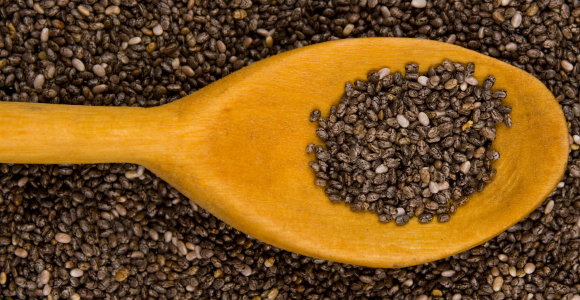Chia seeds are probably best-known as furry sprouts that grow on your Chia Pet. But chia seeds provide more than just silly windowsill decoration--they provide a number of beneficial nutrients to the human body as well.
FROM AZTECS TO MARATHONERS
Chia seeds were once an important staple of the Aztec and Mayan diets. In fact, Aztec warriors used the mighty chia seed as their main fuel source during long hunting trips. Now, they're very popular among marathon runners.
Chia seeds come from the chia plant, which actually belongs to the mint family. They're very small and can be found in both black and white varieties. The seeds have very little taste, only a slightly nutty flavor. While the chia seed is native to Central America, it's gaining popularity so quickly that it can now be found in many grocery stores, especially in health-food stores.
NUTRIENT DENSITY
This nutritional powerhouse can easily be added to any diet. It's hard to believe so many health-promoting nutrients can be found in such a small seed, but it's true:
• Chia seeds provide a highly-concentrated amount of omega-3 fatty acids (heart-healthy fats). They have more omega-3 fats than salmon, and eating chia seeds can be a great way to add this nutrient, known for its heart and brain benefits, if you don't like fish.
• Chia seeds are also a surprisingly good source of calcium with one serving providing 18 percent of your recommended daily intake. Calcium is extremely important for building and maintaining strong bones and muscles, and most people aren't getting enough from their diets. They're also a good source of potassium, which plays an important role in maintaining blood pressure.
• Chia seeds are an excellent source of fiber, providing about 10 grams per each one ounce serving.
• Chia seeds are about 20 percent protein by weight, which is a higher concentration than any other seed or grain. A one ounce serving also provides 4.7 grams of high-quality protein.
• Chia is a potent source of antioxidants. Plus they contain B-vitamins, boron, iron, magnesium, zinc, and phosphorus.
• Chia seeds can also slow down the rate of carbohydrate digestion, preventing spikes in your blood sugar than can cause hunger.
ADDING THEM TO YOUR DIET
Chia seeds can be eaten raw just like any other seed, but they're also easily added to a variety of foods and beverages. When you add water to chia seeds, the seeds swell and form a gel (they absorb about nine times their volume in liquids!), which is why they're often used to thicken foods. Add the gel made from to smoothies, nut butters, oatmeal, yogurt, or sauces. The gel is also used in place of eggs in baked goods. Sprouted chia seeds can be added to salads, sandwiches, or wraps. Additionally, chia can also be used to make "chia fresca," a traditional Mexican beverage made by mixing one tablespoon of chia seeds, one tablespoon of honey, and one tablespoon of lime juice into one cup of water. ¡Salud!
Kari Hartel, RD, LD is a Registered, Licensed Dietitian and freelance writer based out of St. Louis, MO. Kari is passionate about nutrition education and the prevention of chronic disease through a healthy diet and active lifestyle. Kari holds a Bachelor of Science in Dietetics from Southeast Missouri State University and is committed to helping people lead healthy lives. She completed a yearlong dietetic internship at OSF St. Francis Medical Center in Peoria, IL, where she worked with a multitude of clients and patients with complicated diagnoses. She planned, marketed, and implemented nutrition education programs and cooking demonstrations for the general public as well as for special populations, including patients with cancer, heart disease, diabetes, Alzheimer's disease, obesity, and school-aged children. Contact Kari at [email protected].



